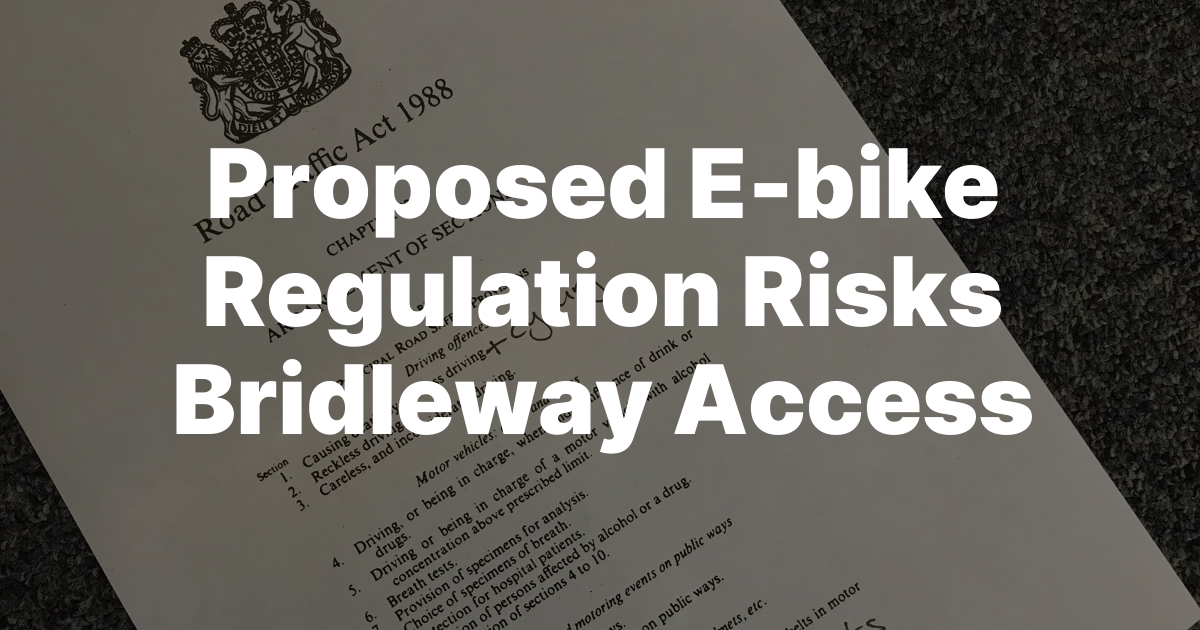
.
.
.
#eBikes #RegulateEbikes #CyclingCommunity #ElectricBikes #BikeRegulation #TrailRiders #EbikeSafety #MotorizedVehicles #BridlewayAccess #FireProofEbikes #EbikeLaws #CyclingAdvocacy #BikeRights #EbikeAwareness #ProtectOurTrails
Source link
A Private Members’ Bill has been introduced in parliament aiming to regulate e-bikes, spurred by recent media coverage and public concerns. The bill proposes reclassifying e-bikes as motorized vehicles, which would significantly restrict where they can be ridden. Currently, e-bikes are permitted on bridleways, but under the new legislation, they would only be allowed in trail centers or on private land. This change is largely in response to complaints from constituents who have had negative encounters with e-bikers, particularly in shared spaces.
One such incident was recounted by local florist Orsa Ploy, who described a frightening experience while walking her dog, Rollo Piaf, on a narrow lane. She claimed that a group of e-bikers passed her at high speed, terrifying her dog to the point where he is now too scared to walk that route again. Ploy’s story, included in the bill’s explanatory notes, highlights the perceived need for stricter regulation to prevent such incidents and ensure public safety.
The bill also addresses concerns about e-bike fires, which have been reported in the media. However, investigations have shown that most fires are linked to unregulated conversion kits or low-quality e-bikes that do not meet safety standards. Despite this, the bill proposes that all e-bikes be sold with a fire-proof protective cover, a measure that has been criticized for its lack of clarity and effectiveness in addressing the root causes of these incidents. Retailers have opposed this requirement, estimating that it would cost brands between £27,745 and £36,657 annually to implement.
The cycling community and industry stakeholders are hopeful that the bill will not progress beyond its initial stages, as it could have significant implications for e-bike users and manufacturers. The proposed regulations could limit the accessibility and convenience of e-bikes, which are increasingly popular for commuting, recreation, and fitness. E-bikes are valued for their ability to connect people and places, promote environmental sustainability, and foster community and freedom. Restricting their use could undermine these benefits and hinder the growth of cycling as a mode of transport and leisure activity.
The bill reflects a broader trend of attempting to regulate cycling, often in response to isolated incidents or misconceptions. While safety and public concerns are valid, critics argue that the proposed measures may be disproportionate and fail to address the underlying issues. For example, the reclassification of e-bikes as motorized vehicles could lead to confusion and unintended consequences, particularly for those who rely on e-bikes for transportation or accessibility.
As the bill moves through parliament, its progress will be closely monitored by cycling advocates, retailers, and e-bike users. The outcome could have far-reaching implications for the future of e-bikes in the UK, shaping how they are perceived, regulated, and integrated into public spaces. For now, the cycling community remains hopeful that the bill will not gain traction, allowing e-bikes to continue to thrive as a sustainable and accessible mode of transport and recreation.







